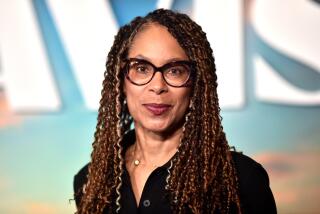How I Made It: Sony Pictures Television exec Helen Verno
The gig: Helen Verno is the queen of television movies and miniseries. An executive vice president at Sony Pictures Television, Verno has overseen the development and production of hundreds of projects during more than two decades with the studio. Her most recent success was the Emmy-nominated “Hatfields & McCoys,” which starred Kevin Costner and Bill Paxton and scored record ratings for the History Channel this year.
Engrossed by movies: A Bronx native, Verno spent her teen years eating popcorn and staring at the big screen. “I grew up in the Loews Paradise.... I would watch Ingmar Bergman films.” While she was watching movies, her father — Max Youngstein — was making them as head of production for United Artists. “Marty” and “Around the World in 80 Days” are among the films he’s credited with greenlighting.
Family first: After graduating from high school, Verno got married and started having children. “I had no plans to do anything beyond staying at home,” she said. “I had a goal to educate myself but I was not on a career path, which was not atypical in those pre-Betty Friedan days.”
Fight the power: In between raising her daughters and taking courses at New York University, Verno did lots of volunteer work and fell in with activist Dolores Huerta, who co-founded the National Farm Workers Assn. with Cesar Chavez. It was trial by fire for Verno. “I would say, ‘I don’t know how’ and she would say, ‘You’ll figure it out.’ ” Before long, Verno was organizing marches in Central Park. “I was there through boycott grapes and boycott broccoli.”
Thank you, Gloria Steinem: One day, Verno’s activism took her to the headquarters of Ms. Magazine, the monthly founded by Gloria Steinem. “I walked in the door and saw only women working in an office and it occurred to me that perhaps I wanted to work.”
Playground connections: Verno was trying to figure out what she might like to do when her friend Diane Sokolow, who frequented the same playground with her family and was head of East Coast production for Warner Bros., offered her work as a freelance reader. “I would read manuscripts and give synopses of them and say whether it could be a movie or not. The pay was something like $30 a book.”
Talent scout: Verno was quickly full time at Warner Bros. and specializing in regional theater, looking for material and writers. “It was an enormously fun thing to do,” she said. It wasn’t glamorous though. “I was put in an office I’m sure was a broom closet.” Over the next few years, Verno bounced between Warner Bros. and Highgate Pictures, rising from a reader to a story editor until finally making it to the promised land of development.
Back to school: As a development executive at Highgate, Verno cut her teeth making “ABC Afterschool Specials” as well as star-studded miniseries such as “Chiefs” with Charlton Heston and “Queenie” with Kirk Douglas. “There were a lot of miniseries in those days.”
Behind the wheel: After Highgate was acquired by New World, Verno was asked to relocate from New York to Los Angeles for a year that became the rest of her life. A lifelong New Yorker, Verno had never learned to drive so at age 50 she found herself taking lessons. “To this day I do not drive on the freeways, but I manage to get everywhere I need to go. Sepulveda [Boulevard] is my lifeline. If it closes, I’m done.”
New business: When Verno entered the business, it was a boom time for TV movies and miniseries. Then the broadcast networks lost interest in them. Now cable channels are betting on the genre, especially in the wake of “Hatfields & McCoys.” “It was so exciting because it validated that there’s no better way to tell a story. I’m glad to see there is some awakening to that.” Next up, she’ll oversee a new version of the 1989 movie “Steel Magnolias,” this time starring Queen Latifah. It premieres on Lifetime in October.
Balancing act: Verno was blessed by having a liberated husband. “He loved to take care of the kids and he loved to cook and there was never a day when he wasn’t encouraging.” He was also successful enough to retire at age 50 just when his wife’s career was taking off. “We switched roles. The happiest thing in the world was for him to be at home.”
No slowing down: “I’m past 70 now and people say to me, ‘Why are you still working?’ It’s still fun and keeps me thinking.”
More to Read
Inside the business of entertainment
The Wide Shot brings you news, analysis and insights on everything from streaming wars to production — and what it all means for the future.
You may occasionally receive promotional content from the Los Angeles Times.











